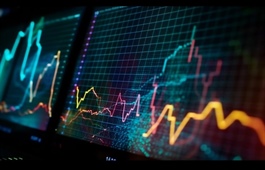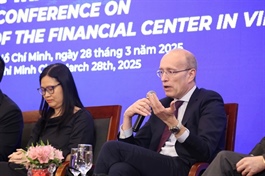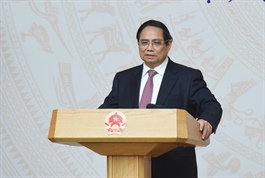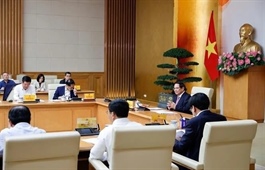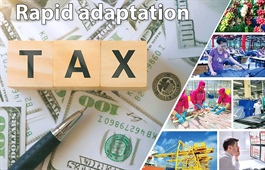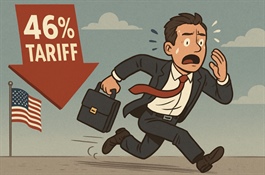Exchange rates react sharply to US tariffs
Exchange rates react sharply to US tariffs
Banking experts are attempting to piece together the likely impacts of tough worldwide tariffs imposed by the United States, with Vietnam’s central bank under the microscope when it comes to maintaining low interest rates.
The USD has slumped to its lowest level in six months amid the impact of new tariffs, while in Vietnam, commercial banks have adjusted exchange rates close to the VND26,000 per USD.
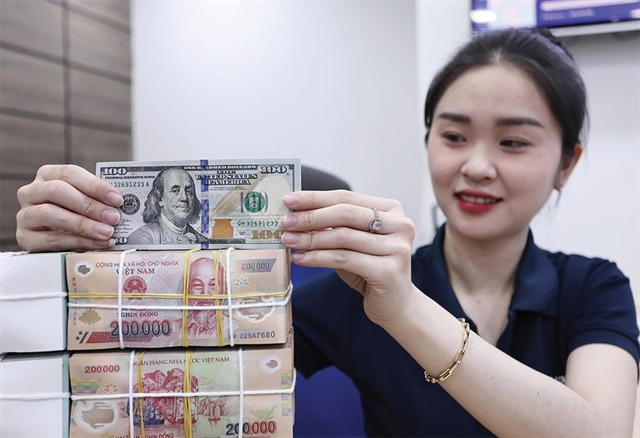
Financial experts hint that the USD exchange rate could soon hit a record high of VND26,000 |
On the morning of April 3 Vietnam time, US President Donald Trump announced retaliatory tariffs on 185 countries and territories, including a 46 per cent tariff on Vietnamese exports, set to take effect on April 9. Immediately following the announcement, the USD saw a sharp decline against major currencies in the US Dollar Index (DXY).
During the April 3 trading session, the euro marked its sharpest single-day gain against the dollar since December 2015 and the highest exchange rate recorded in the past six months. The British pound also strengthened, rising 1.1 per cent, according to data from CNBC.
The DXY closed the day at 102.07, the lowest level since October 2024, marking a 1.7 per cent drop from the previous session, according to MarketWatch.
On the same day, Germany’s Deutsche Bank issued a warning about the risk of a confidence crisis surrounding the USD, amid escalating global trade tensions fuelled by the tariff policies.
“Capital flows could shift significantly, creating major disruptions in the currency markets. The greater risk lies in a prolonged erosion of confidence in the USD, which could trigger heightened volatility in the foreign exchange market beyond the scope of central bank control,” stated George Saravelos, global head of FX Research at Deutsche Bank.
The warning extended beyond the US, with potential spillover effects on the eurozone. The European Central Bank (ECB) is increasingly concerned that a weakening USD, coupled with a sharp appreciation of the euro, could deliver an external deflationary shock to the bloc.
“The ECB does not want to see a deflationary shock triggered by a simultaneous loss of confidence in the USD and a rapid strengthening of the euro alongside tariff policies,” added Saravelos.
By the morning of April 4, DXY had slipped below 102, posting a five-session decline of over 2 per cent, and bringing the year-to-date loss to more than 6 per cent.
Financial analysts attribute the USD’s widespread depreciation, reaching a six-month low against both the euro and Japanese yen, to investor concerns over the global trade and economic growth impact of the US tariff policy.
Analysts noted that gold and the Swiss franc have also emerged as safe-haven assets of choice among global investors, as tariff retaliation sends the USD into a downward spiral and prompts a sell-off in higher-risk assets like equities.
Policies affected
In the domestic market on April 4, the State Bank of Vietnam (SBV) set the central exchange rate at VND24,886 per USD, up VND32 from the previous session.
The SBV’s transaction office also adjusted its quoted reference rates to 23,692 VND/USD on the buying side and 26,080 VND/USD on the selling side.
Economist Nguyen Tri Hieu noted that the sweeping US tariff move has rattled global markets. “In Vietnam, a 46 per cent tariff on exports to the US will likely reduce foreign exchange earnings, leading to a shortage of USD supply in the domestic market and putting upward pressure on the exchange rate,” he said.
“I expect the USD/VND rate could rise by 5-10 per cent this year, although this projection may need adjustment due to ongoing complexities,” he added. “A rising exchange rate will affect the SBV’s interest rate policy. With US inflation still high, the US Federal Reserve is unlikely to continue cutting rates, and this will constrain the SBV’s ability to maintain low interest rates.”
Dang Nguyet Minh, head of Research at Dragon Capital, estimated a GDP impact of 1.5–2 per cent if the tariff rate materialises, and highlighted two key factors to monitor.
“First are external factors such as Vietnam’s relative growth prospects and US monetary policy. After the US announcement, the DXY fell further, and US Treasury yields declined despite inflation fears,” Minh said. “This indicates that the market expects higher recession risks, prompting expectations that the US Fed may accelerate rate cuts, weakening the USD and lowering yields. In this scenario, pressure on Vietnam’s exchange rate may not be overly severe.”
The second factor, she noted, is Vietnam’s relatively modest foreign exchange reserves, currently around $80 billion, which may be increasingly used for imports from the US.
“However, when it comes to the USD/VND rate, investor sentiment in Vietnam plays a more critical role. While short-term volatility may be significant, medium- and long-term exchange rates are more reflective of economic fundamentals. The government’s focus on ramping up public investment in the latter half of the year should also help stabilise the outlook,” she added.
Record high in reach
Following the tariff announcement, the USD skyrocketed in the Vietnamese market. On April 3, the SBV raised its central rate by 3 units to VND24,854 per USD.
Commercial banks also saw sharp increases as by the afternoon of April 3, most notably Vietcombank, Eximbank, and Sacombank.
According to Tran Hoang Son, chief market strategist at VPBank Securities, the 46 per cent retaliatory tariff could have sweeping effects on Vietnam’s economy, including trade, growth, exchange rates, inflation, and foreign investment.
“If the SBV intervenes by selling forex reserves, the USD/VND rate may rise by 3–5 per cent in 2025. In a scenario where multiple markets face similar tariffs and the Chinese yuan weakens in response, exchange rate pressures will intensify, requiring more flexible interventions to stabilise the forex market,” said Son.
Pham Luu Hung, head of SSI Research, noted that the VND had already been depreciating over time, creating a buffer against short-term shocks. “Exchange rates remain a critical metric to watch, but the SBV still has sufficient tools to maintain short-term stability,” Hung said.
Hung cited February as an example, when despite a weakening USD, exchange rate volatility increased due to rising domestic foreign currency demand from importers.
“At that time, the SBV removed its previous hard cap on interbank rates of 25,450 VND/USD. On February 11, the central bank raised its intervention rate for the first time since October 2024 to VND25,698, signalling its willingness to tolerate greater exchange rate fluctuations to ease pressure on foreign reserves, which fell by over $9 billion last year,” added Hung.
As global trade conditions remain volatile, financial experts warn that the exchange rate could soon hit a record high of VND26,000. To manage exchange rate risks, authorities are aiming for a stable but flexible regime, avoiding rigid pegs amid deepening global integration.
UOB experts wrote, “Businesses should prioritise tight cash flow management. With a clear financial and capital usage plan, they can time foreign currency conversions more advantageously and use hedging instruments to optimise operations.”
On a more optimistic note, Standard Chartered CEO Bill Winters expressed confidence in Vietnam’s strong economic fundamentals and its resilience beyond US reliance.
“All central banks aim to stabilise prices, avoiding inflation or deflation, and to maintain financial system stability. If high tariffs significantly harm the economy, central banks may lower rates, weakening their currencies and mitigating the impact of trade barriers.”
Nevertheless, Winters warned that extremely high tariffs on countries like Vietnam would undoubtedly impact economic growth.
“Vietnam’s growth momentum remains strong. Even under pressure, the economy will continue expanding, albeit at a slower pace. Hopefully, these tariffs will not be enforced, so we don’t have to deal with their repercussions on currency markets,” he added.
- 09:41 09/04/2025







